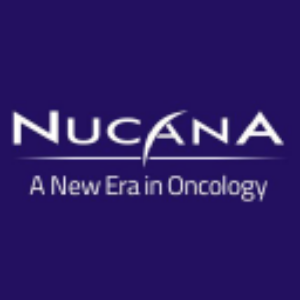NuCana Presents Data at the AACR 2024 Annual Meeting Highlighting the Ability of NUC-7738 to Profoundly Alter Tumor Biology in a Paired Biopsy Clinical Study
NUC-7738 Reprograms Cancer Cell Lipid Metabolism to Make Tumors Less Aggressive and Promote Cancer Cell Death
NUC-7738 Alters Ribosome Biogenesis and the Regulation of Genes Critical for Cancer Growth and Survival
SAN DIEGO, April 09, 2024 (GLOBE NEWSWIRE) -- NuCana plc (NASDAQ: NCNA) announced two posters being presented today at the American Association of Cancer Research (AACR) Annual Meeting.
Title: Exposing the Heterogeneity of the Lipidome in the TME of Cutaneous Melanoma Following Treatment with NUC-7738 in Combination with anti-PD-1 Therapy
Presentation date and time: April 9, 2024 from 1:30pm-5:00pm PDT
Abstract number: 6222
The tumor microenvironment (TME) is a complex interplay of various cell types, extracellular matrix, signalling molecules and physical factors that collectively influence tumor growth. Lipids play an important role in the TME, contributing to various aspects of cancer progression and therapy resistance. A novel methodology, including imaging mass spectrometry, was developed to investigate the spatial relationship between the lipidome and TME using paired biopsies from patients treated with NUC-7738. NUC-7738 was found to increase polyunsaturated fatty acids within the TME, which is indicative of a shift to a less aggressive cancer type and to decrease monounsaturated fatty acids which are associated with malignant behavior and chemotherapy resistance. In addition, NUC-7738 was shown to reduce lipids associated with protection against cancer cell death and to increase lipids associated with cancer cell death. Multi-modal imaging indicated that this lipid reprogramming is a result of the alteration in enzymes associated with lipid metabolism.
Title: RNA Regulatory Disruption by 3’-dATP: A Novel Approach to Inhibit Ribosome Biogenesis in Cancer
Presentation date and time: April 9, 2024 from 1:30pm-5:00pm PDT
Abstract number: 5650
Ribosome biogenesis is a complex process that plays a pivotal role in protein translation which can become dysregulated in cancer. Thus, ribosome targeting therapies are an attractive treatment modality for anti-cancer medicines. This study investigates the impact of NUC-7738, which generates high intracellular levels of the active anti-cancer metabolite 3’-deoxyadenosine triphosphate (3’-dATP), on the generation of mRNAs and proteins associated with ribosome biogenesis. Data from cancer cell lines, confirmed using paired biopsies of patients treated with NUC-7738, demonstrated that NUC-7738 significantly modulated the levels of RNAs which are important for translational control of protein synthesis. Furthermore, data also highlight NUC-7738’s potential to influence the regulation of genes critical for cancer cell growth and survival.
Hugh S. Griffith, NuCana’s Founder and Chief Executive Officer said: “We are excited to present these results as we believe they demonstrate NUC-7738’s multi-faceted mechanisms of action. They also further explain the compelling clinical data we have generated with NUC-7738 as a monotherapy and in combination with pembrolizumab. We recently presented clinical data from the ongoing NuTide:701 study of NUC-7738 in combination with pembrolizumab which demonstrated that NUC-7738 may potentiate the activity of pembrolizumab in patients who were refractory to PD-1 inhibitor-based therapy. Our translational data help us to understand these clinical observations and guide the optimal development pathway for NUC-7738. We look forward to sharing additional data for NUC-7738 in 2024.”
About NuCana
NuCana is a clinical-stage biopharmaceutical company focused on significantly improving treatment outcomes for patients with cancer by applying our ProTide technology to transform some of the most widely prescribed chemotherapy agents, nucleoside analogs, into more effective and safer medicines. While these conventional agents remain part of the standard of care for the treatment of many solid and hematological tumors, they have significant shortcomings that limit their efficacy and they are often poorly tolerated. Utilizing our proprietary technology, we are developing new medicines, ProTides, designed to overcome the key limitations of nucleoside analogs and generate much higher concentrations of anti-cancer metabolites in cancer cells. NuCana’s pipeline includes NUC-3373 and NUC-7738. NUC-3373 is a new chemical entity derived from the nucleoside analog 5-fluorouracil, a widely used chemotherapy agent. NUC-3373 is currently being evaluated in three ongoing clinical studies: a Phase 1b/2 study (NuTide:302) in combination with leucovorin, irinotecan or oxaliplatin, and bevacizumab in patients with metastatic colorectal cancer; a randomized Phase 2 study (NuTide:323) in combination with leucovorin, irinotecan, and bevacizumab for the second-line treatment of patients with advanced colorectal cancer; and a Phase 1b/2 modular study (NuTide:303) of NUC-3373 in combination with the PD-1 inhibitor pembrolizumab for patients with advanced solid tumors and in combination with docetaxel for patients with lung cancer. NUC-7738 is a transformation of 3’-deoxyadenosine, a novel anti-cancer nucleoside analog. NUC-7738 is in the Phase 2 part of a Phase 1/2 study in patients with advanced solid tumors which is evaluating NUC-7738 as a monotherapy and in combination with pembrolizumab.
Forward-Looking Statements
This press release may contain “forward-looking” statements within the meaning of the Private Securities Litigation Reform Act of 1995 that are based on the beliefs and assumptions and on information currently available to management of NuCana plc (the “Company”). All statements other than statements of historical fact contained in this press release are forward-looking statements, including statements concerning the Company’s planned and ongoing clinical studies for the Company’s product candidates and the potential advantages of those product candidates, including NUC-3373 and NUC-7738; the initiation, enrollment, timing, progress, release of data from and results of those planned and ongoing clinical studies; the Company’s goals with respect to the development, regulatory pathway and potential use, if approved, of each of its product candidates; and the utility of prior non-clinical and clinical data in determining future clinical results. In some cases, you can identify forward-looking statements by terminology such as “may,” “will,” “should,” “expects,” “plans,” “anticipates,” “believes,” “estimates,” “predicts,” “potential” or “continue” or the negative of these terms or other comparable terminology. Forward-looking statements involve known and unknown risks, uncertainties and other factors that may cause the Company’s actual results, performance or achievements to be materially different from any future results, performance or achievements expressed or implied by the forward-looking statements. These risks and uncertainties include, but are not limited to, the risks and uncertainties set forth in the “Risk Factors” section of the Company’s Annual Report on Form 20-F for the year ended December 31, 2023 filed with the Securities and Exchange Commission (“SEC”) on March 20, 2024, and subsequent reports that the Company files with the SEC. Forward-looking statements represent the Company’s beliefs and assumptions only as of the date of this press release. Although the Company believes that the expectations reflected in the forward-looking statements are reasonable, it cannot guarantee future results, levels of activity, performance or achievements. Except as required by law, the Company assumes no obligation to publicly update any forward-looking statements for any reason after the date of this press release to conform any of the forward-looking statements to actual results or to changes in its expectations.
For more information, please contact:
NuCana plc
Hugh S. Griffith
Chief Executive Officer
T: +44 131-357-1111
E: info@nucana.com
ICR Westwicke
Chris Brinzey
T: +1 339-970-2843
E: chris.brinzey@westwicke.com








